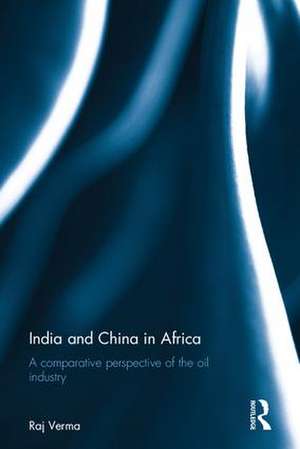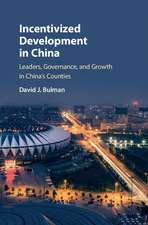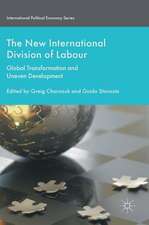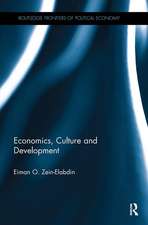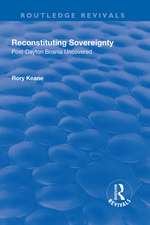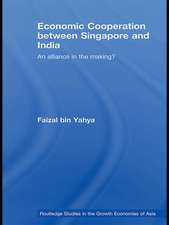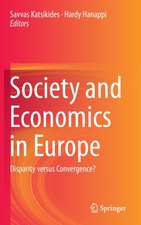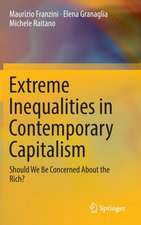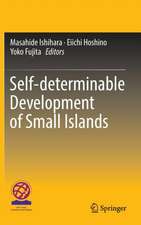India and China in Africa: A comparative perspective of the oil industry: Routledge Series on India-China Studies
Autor Raj Vermaen Limba Engleză Hardback – 15 dec 2016
This book analyses the acquisition of oil blocks by Indian and Chinese oil corporations in eleven West African countries. It describes the differences in how India and China mobilise oil externally to meet their respective goals and objectives. The book examines the rate of return on capital, rate of interest on loans and the ease of availability of loans, the difference in the level of technology and ability to acquire technology, project management skills, risk aversion, valuation of the asset and the difference in the economic, political and diplomatic support received by the Chinese and Indian oil companies from their respective governments. It is argued that the difference in the relative economic and political power of India and China accounts for the ability of Chinese oil companies to outbid their Indian competitors and/or be preferred as partners by international oil companies.
Containing interviews from Indian and Chinese oil company executives, government officials, industry officials, former diplomats and scholars and academics from India, China and the UK, this book makes a valuable contribution to existing literature on India, China and the oil industry in West Africa. It will be a valuable resource for academics in the field of International Relations, Foreign Policy Analysis, Asian Business and Economics.
| Toate formatele și edițiile | Preț | Express |
|---|---|---|
| Paperback (1) | 416.22 lei 6-8 săpt. | |
| Taylor & Francis – 23 aug 2018 | 416.22 lei 6-8 săpt. | |
| Hardback (1) | 1057.89 lei 6-8 săpt. | |
| Taylor & Francis – 15 dec 2016 | 1057.89 lei 6-8 săpt. |
Preț: 1057.89 lei
Preț vechi: 1290.10 lei
-18% Nou
Puncte Express: 1587
Preț estimativ în valută:
202.43€ • 209.99$ • 168.80£
202.43€ • 209.99$ • 168.80£
Carte tipărită la comandă
Livrare economică 27 martie-10 aprilie
Preluare comenzi: 021 569.72.76
Specificații
ISBN-13: 9781138121935
ISBN-10: 1138121932
Pagini: 302
Ilustrații: 4 Line drawings, black and white; 35 Tables, black and white; 4 Illustrations, black and white
Dimensiuni: 156 x 234 x 23 mm
Greutate: 0.54 kg
Ediția:1
Editura: Taylor & Francis
Colecția Routledge
Seria Routledge Series on India-China Studies
Locul publicării:Oxford, United Kingdom
ISBN-10: 1138121932
Pagini: 302
Ilustrații: 4 Line drawings, black and white; 35 Tables, black and white; 4 Illustrations, black and white
Dimensiuni: 156 x 234 x 23 mm
Greutate: 0.54 kg
Ediția:1
Editura: Taylor & Francis
Colecția Routledge
Seria Routledge Series on India-China Studies
Locul publicării:Oxford, United Kingdom
Public țintă
PostgraduateCuprins
Part I Introduction
Part II Conceptual framework and background
1. Neoclassical Realsim
2. India and China in Africa and West Africa
Part III India and China
3. India and China: difference in power and political economies
4. Oil industry in India and China
Part IV Case Studies
5. India and China in Angola
6. India and China in Nigeria
7. India and China in eight countries in West Africa
Part V Conclusion
Part II Conceptual framework and background
1. Neoclassical Realsim
2. India and China in Africa and West Africa
Part III India and China
3. India and China: difference in power and political economies
4. Oil industry in India and China
Part IV Case Studies
5. India and China in Angola
6. India and China in Nigeria
7. India and China in eight countries in West Africa
Part V Conclusion
Notă biografică
Dr Raj Verma is Assistant Professor in International Relations at the School of International and Public Affairs at Jilin University, China. His research is focused on India’s and China’s foreign policy and comparative political economy, India and China in Africa, India-China-US relations and international relations theory.
Recenzii
'Prof. Verma has indeed undertaken an extraordinary study in a record time replete with academic references and records of interviews with the leading personalities involved in policymaking.'
K. Subramanian, Chennai Centre for China Studies
K. Subramanian, Chennai Centre for China Studies
Descriere
This book analyses the acquisition of oil blocks by Indian and Chinese oil corporations in eleven West African countries. It describes the differences in how India and China mobilise oil externally to meet their respective goals and objectives. It examines the rate of return on capital, rate of interest on loans and the ease of availability of loans, the difference in the level of technology and ability to acquire technology, project management skills, risk aversion, valuation of the asset and the difference in the economic, political and diplomatic support received by the Chinese and Indian oil companies from their respective governments.
